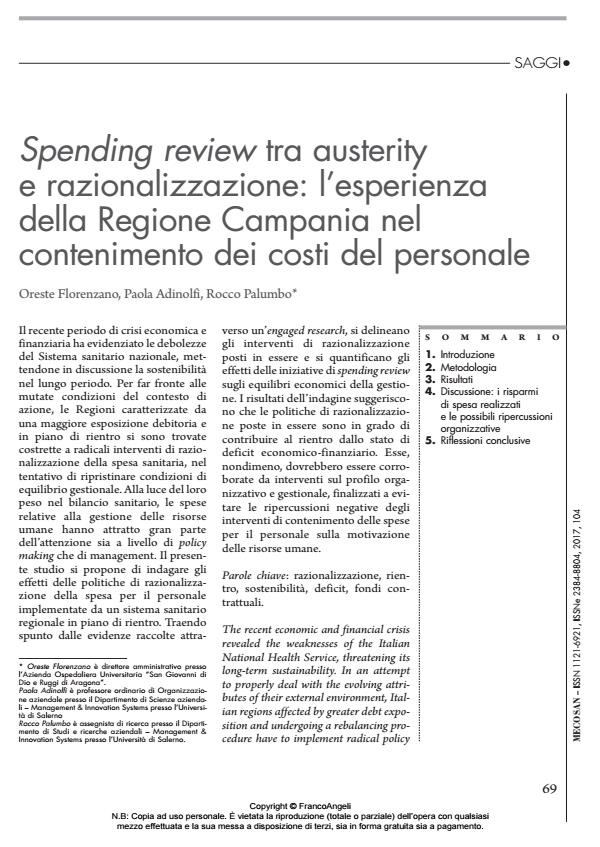Spending review tra austerity e razionalizzazione: l’esperienza della Regione Campania nel contenimento dei costi del personale
Journal title MECOSAN
Author/s Oreste Florenzano, Paola Adinolfi, Rocco Palumbo
Publishing Year 2018 Issue 2017/104
Language Italian Pages 19 P. 69-87 File size 23678 KB
DOI 10.3280/MESA2017-104005
DOI is like a bar code for intellectual property: to have more infomation
click here
Below, you can see the article first page
If you want to buy this article in PDF format, you can do it, following the instructions to buy download credits

FrancoAngeli is member of Publishers International Linking Association, Inc (PILA), a not-for-profit association which run the CrossRef service enabling links to and from online scholarly content.
The recent economic and financial crisis revealed the weaknesses of the Italian National Health Service, threatening its long-term sustainability. In an attempt to properly deal with the evolving attributes of their external environment, Italian regions affected by greater debt exposition and undergoing a rebalancing procedure have to implement radical policy and managerial interventions in order to rationalize their health expenditure. Ultimately, these interventions should aim at restoring the economic and financial equilibria of public health care organizations. In light of its relevant role in the health care budget, human resource management expenditure has drawn an increasing attention at both the policy and the management levels. This paper aims at investigating the consequences of the policies intended to rationalize human resource expenditures, focusing the attention on an Italian regional health system undergoing a rebalancing procedure. Sticking to the evidence collected from an engaged research, the manuscript describes the interventions implemented and tries to determine the effects of spending review initiatives on the financial and economic equilibria of health care organizations. The research findings point out that rationalization policies are effective in halting the economic and financial deficit of health care organizations. However, they should be supported by tailored initiatives at the organizational and the managerial levels, in order to minimize negative drawbacks on human resources’ motivation and commitment.
Keywords: Rationalization, Rebalancing, Sustainability, Deficit, Contractual funds.
- Framing the Shades of Sustainability in Health Care: Pitfalls and Perspectives from Western EU Countries Elio Borgonovi, Paola Adinolfi, Rocco Palumbo, Gabriella Piscopo, in Sustainability /2018 pp.4439
DOI: 10.3390/su10124439
Oreste Florenzano, Paola Adinolfi, Rocco Palumbo, Spending review tra austerity e razionalizzazione: l’esperienza della Regione Campania nel contenimento dei costi del personale in "MECOSAN" 104/2017, pp 69-87, DOI: 10.3280/MESA2017-104005